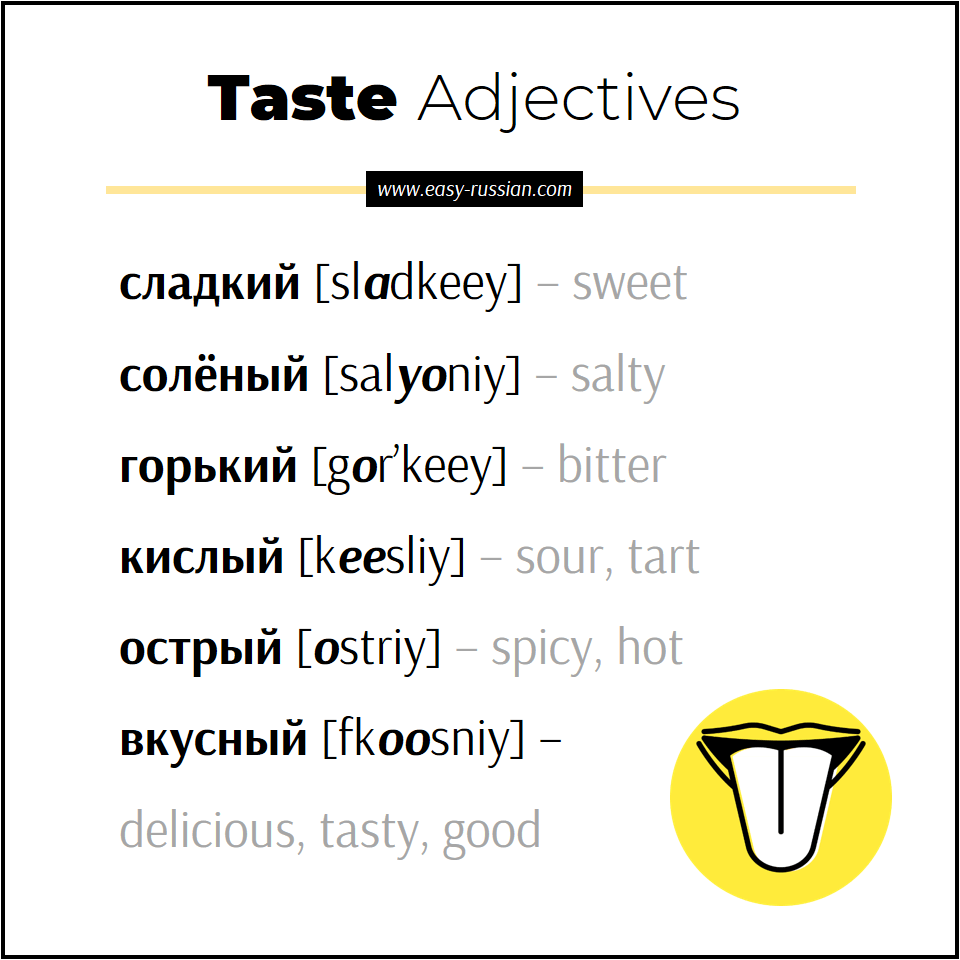Describing Taste and Smell: Useful Words and Phrases
Describing taste and smell is an essential skill for anyone who wants to speak Russian. Understanding the vocabulary of taste and smell can help you better articulate your thoughts and ideas.
This article covers over different words and phrases to help you find the perfect way to talk about the flavors you love or the smells that remind you of home. Get to know the language better and improve your conversations with this guide!
But first, I recommend watching a video on this topic:
How to Describe Smells
Describing a smell (запах [zapah]) can be challenging, but here are some words and phrases that you can use to describe different types of smells.
First, you need to know some important verbs:
пахнуть = иметь запах – to have a smell
Этот чай приятно пахнет. – This tea smells nice.
Здесь чем-то приятно пахнет. – Something smells good in here.
От него пахнет алкоголем и мятными леденцами. – He smells of alcohol and breath mints
От него пахнет её духами. – He smells like her perfume.
We use instrumental case with this verb.
Его одежда пахнет дымом. – His clothes smell of smoke.
Мои руки пахнут луком. – My hands smell of onions.
вонять – to have an unpleasant smell, to stink
У тебя ноги воняют. Почему бы тебе их не помыть? – Your feet smell. Why don’t you wash them?
нюхать – to smell (to sniff)
Понюхай эти цветы. – Smell these flowers.
Words to describe pleasant smells:
- ароматный (fragrant)
- приятный (pleasant)
- свежий (fresh)
- пряный (spicy)
Examples:
ароматный кофе – fragrant coffee
ароматный чай – fragrant tea
Этот ароматный цветок встречается по всему миру. – This aromatic flower is found all over the world.
У этих цветов очень приятный запах. – These flowers have a really nice fragrance.
Розы имеют приятный запах. – Roses have a nice fragrance.
Мне нравится запах свежего хлеба. – I like the smell of fresh bread.
Тёплый день приносит с собой свежий запах фруктов и овощей. – A warm day brings along with it the fresh smell of fruits and vegetables.
Words to describe unpleasant smells:
- неприятный (unpleasant)
- отвратительный (disgusting, revolting)
- дурной (bad)
- вонючий, зловонный (stinky)
- резкий (pungent)
- едкий (acrid)
- гнилой (putrid)
- затхлый (musty)
- тухлый (rotten)
Example sentences:
Все ядовитые грибы неприятно пахнут, а съедобные имеют приятный запах. – All poisonous mushrooms smell unpleasant, and edible ones have a pleasant smell.
Дурной запах изо рта по утрам присутствует практически у каждого. – Bad odor from the mouth in the early morning is seen in almost all individuals.
Ты вонючий толстый пьяница. – You’re a fat, stinking drunk.
В доме стоял резкий запах газа. – There was a strong smell of gas in the house.
Neutral smells:
- без запаха (odorless, scentless)
- слабый (faint, weak)
- тонкий, едва уловимый (subtle)
- сильный (strong)
You can also use adjectives like цветочный, фруктовый, конфетный to describe a particular smell:
Этот парфюм имеет цветочный аромат. – This perfume has a floral fragrance.
When talking about smells, it can also be helpful to use comparisons to familiar scents or objects, such as “smells like fresh-cut grass” (пахнет как свежескошенная трава) or “smells like an orange” (пахнет как апельсин). Additionally, consider the intensity, duration, and overall impression of the smell.
Этот шампунь пахнет как текила. – That shampoo smells a lot like tequila.
От вас пахнет как от туалета. – You smell like a toilet.
Здесь сильно пахнет хлором. – It strongly smells like chlorine in here.
See Also: Russian Vocabulary For Perceptions Of The Five Senses
How to Describe Taste
Describing taste can be a bit subjective, but there are some common words and phrases that can help you communicate about different flavors and sensations. Here are some adjectives to describe taste:
сладкий – sweet
кислый – sour, tart
солёный – salty
горький – bitter
острый – spicy, hot
терпкий – tart

When we judge whether or not the food tastes good, we use the following words:
вкусный – delicious, tasty, good
Этот торт очень вкусный. – This cake is very good.
Очень вкусно! – Very tasty/good!
невкусный – doesn’t taste good
гадость – gross, muck
Overall, the key to describing taste and smell is to pay attention to the details and be specific in your language. By using a variety of adjectives and comparisons, you can help others better understand the flavors and aromas you are experiencing. With practice, you’ll become more confident in your ability to describe taste and smell in Russian.
